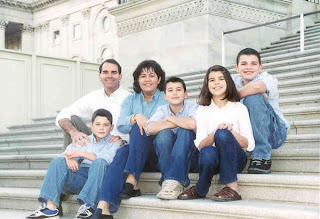 [Photo: Jay Bybee and family / Meridian]
[Photo: Jay Bybee and family / Meridian]NYT editorializes for the impeachment of Jay Bybee, torture memo author, current federal appeals court judge, on the grounds of a warped understanding of the President's constitutional powers. All this re: his writing torture into the law.
NYT linked to the new documents, which cover warrantless wiretapping, use of the US military to pursue terrorists domestically, pulling out of the Anti-Ballistic Missile Treaty, detention of American citizens charged with terrorism, and extraordinary rendition. They skip the torture memo because it's long been released, Bybee has long been on the bench, and John Yoo is the only person out there vociferously defending his crimes.
We'll leave aside the contradiction inherent NYT's romantic prose and pragmatic posture, suing for Bybee's dismissal six years after his nomination and at a time of Democratic ascendancy. In 2004, he was a footnote to an opinion denouncing Thomas Griffith; NYT hasn't always demanded his impeachment/resignation. They just got on the boat today.
Again, leaving all that aside, the real problem is in the perceived boundary between academic behavior and political behavior. Bybee is a judge and can be impeached for high crimes and misdemeanors. John Yoo is a professor and is, apparently, exempt from such calumny. Both men issued legal opinions that rationalized all manner of weirdo executive branch usurpations of power. One is in the Academy, so he's clear. It's as if Stanley Fish were on the editorial board, and you can say and do whatever wack shit you feel (Ward Churchill) so long as you don't try to problematize the Academy itself (Denis Rancourt).
Conspiracy theorists, people who want Iran bombed yesterday, people who want Israel pushed into the sea, war criminals and ordinary street freaks -- all their actions are OK so long as they 1) stay in the Academy 2) keep the Academy away from "ordinary life". This is how we get into Bybee-not-Yoo, Rancourt-not-Churchill hair-splitting.
Just come out and tell us which sorts of academic freedom are legitimate and which are not, and stop pussyfooting...by which I mean Fish's position on Columbia's bringing Mahmoud Ahmadinejad to speak: the University administrator is beyond politics.
This is a total fallacy. Academic positions are already constructed as political, whether you like it or not. Teach engineering? To what end? To build more and better highway off-ramps? OK, or statistics -- you know how much blood has been shed over sampling methods and the census? What about the relationship of calculus to ballistic missiles? Or the complicity of art in legitimating a culture of
See also, and I'm speaking to you Stanley, how deferring the ethical point of contact onto the decision to act ethically in opposition to academic standards negates the difference between good and bad acts? If the standard for a person's actions is not "Does this promote the good life?" but "Is this covered in the provost's integrity manual?" one can act inethically and legally at the same time.
Impeach Bybee, but fire John Yoo too.
--
ds


No comments:
Post a Comment